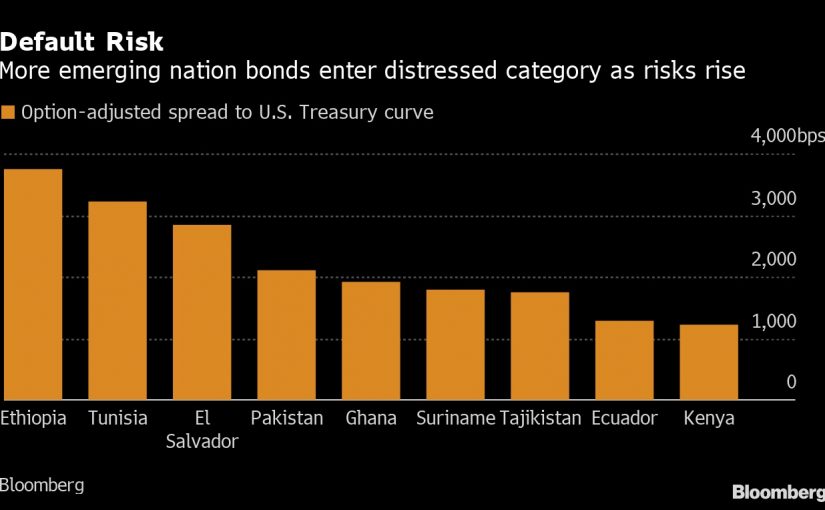Ozzy Osbourne, lead of Black Sabbath and godfather of heavy metal, dies at 76
China question looms large as EM distressed-debt club grows

Image: Bloomberg
- Beijing holds the aces as creditors sweat on recovery levels
- Defaulted Sri Lanka is new battle ground for debt negotiations
Bondholders of emerging markets that may have to restructure debt are watching Sri Lanka’s unfolding credit crisis with a burning question: What will China do?
Beijing is the largest official creditor to developing nations and investors say it’s unclear how lenient it’ll be in demanding repayment from distressed borrowers. They view Sri Lanka as a test case, and whether China demands repayment in full or accepts a haircut will determine how much private creditors including bondholders could recover in case of a default.
A record 21 emerging market sovereigns’ dollar bonds are trading in distressed territory, according to data compiled by Bloomberg. Some of those may join Sri Lanka and Belarus who defaulted this year as the global economic slowdown and the war in Ukraine cut all but the highest-rated sovereign issuers off from international debt capital markets.
“One of the biggest problems of China’s prominence as a creditor to emerging markets is the lack of transparency in its bond contracts,” said Dave Loevinger, Los Angeles-based managing director at TCW Group Inc., which holds Sri Lankan debt. “We don’t know how it is going to behave in a restructuring.”
Western creditor nations like the US are unwilling to let International Monetary Fund and World Bank bailouts be used to repay China, while China is loathe to provide debt relief so that multilateral institutions and bondholders could get paid, said Loevinger, who is a former senior coordinator for China affairs at the US Treasury.
Sri Lanka will be the key test because it has diverse creditors including the Paris Club, China, India and bondholders. Unlike Zambia, which defaulted in 2020 and is now in talks with creditors, Sri Lanka is not eligible for so-called Common Framework debt relief as it’s a middle-income country. That makes it a more meaningful blueprint for other middle-income emerging economies.
China typically collateralizes its infrastructure loans, giving it stronger bargaining power and lessening the incentive to work together in a restructuring with unsecured creditors, who have little or no legal recourse. In Sri Lanka, for example, China took control of the port of Hambantota after the country couldn’t repay a loan.
“Wherever you have China involved, the negotiations have become much more complicated and as a consequence much longer than they would be if it was just restructuring private debt holders,” said Phillip Torres, a senior portfolio manager of emerging market debt at Aegon Asset Management in Chicago. “Private bondholders’ legal recourses are limited to, basically, negotiation.”
It took 16 months discussions before China finally agreed to join Zambia’s creditor committee in April. Almost two years after its default, the southern African country is now close to a deal with official creditors, China included, that could unlock a $1.4 billion bailout from the IMF, President Hakainde Hichilema said last week.
China is willing to provide support and assistance within its capacity to Sri Lanka, Chinese state television cited President Xi Jinping as saying in a message to Sri Lanka’s new president. Xi also said he believes Sri Lanka would be able to overcome temporary difficulties and advance economic recovery. Zambia’s second meeting with the official creditors committee on July 18 was a “very successful one,” China’s Ambassador to Zambia, Du Xiaohui, said in comments streamed on state-owned ZNBC, adding that “we can resolve the debt issue.”
But while China may be willing to discuss rescheduling or postponing payments, the question remains whether it will demand full redemption of the principal.
“China is notoriously reluctant to disclose what’s going on in its negotiations with debtor countries, to communicate, let alone coordinate with other creditors,” said Elena Daly, founder of EM Conseil, a Paris-based advisory firm specializing in sovereign debt management. “It is also notoriously reluctant to agree to haircuts.”
Elsewhere in credit markets:
EMEA
NRW Bank is the only deal today in Europe’s primary bond market, the day after credit risk benchmarks jumped by the most since the early coronavirus turmoil as the continent faces a gas squeeze.
- Ukraine’s state-owned energy company, NJSC Naftogaz Ukrainy, will “urgently” present a new plan to delay debt payments. The grace period for it to redeem $335 million of international bonds expired on Tuesday as the government blocked the payment and after bondholders rejected a restructuring proposal earlier this month
- Italy’s sovereign debt rating outlook was lowered by S&P Global Ratings after the recent political turmoil that resulted in the resignation of Mario Draghi and the calling of fresh elections
- BlackRock Inc. has raised a total of £1.7 billion pounds from UK pension plans to invest in a private debt fund
Asia
Debt spreads rose in Asia ahead of the Federal Reserve’s upcoming decision, with no primary-market dollar debt deals for a second session.
- Investment-grade dollar bond spreads in Asia excluding Japan widened as much as 1 basis point, while the cost to insure such debt against default climbed about 4 basis points during Asian hours, according to a trader
- Global green bonds are on course for their first month of positive returns in a year, outperforming broader debt in a move that’s likely to spur pent-up investor appetite for the asset class
- China’s largest developer by sales is selling new shares at a discount, highlighting the sense of urgency among property developers to raise cash
- A default scare at a Philippine conglomerate highlights the challenges the country’s new president Ferdinand Marcos Jr. faces in trying to tame rapid inflation without causing economic growth to falter
Americas
Traders will have all eyes on the Federal Reserve decision later, with ten-year Treasury yields having slumped almost 75 basis points in a matter of weeks as prospects of a recession are priced in.
- Markets were starting to price in a 100-basis point increase after the June inflation figures, but that position has mellowed since Governor Christopher Waller and St. Louis Fed President James Bullard expressed a preference for 75 basis points
- The junk bond default rate in the US is expected to rise between 4.7% and 5.9% over the next 12 months, warning investors to not wade back into the market too soon amid a rally, according to BCA Research
- 3M Co. has placed its Aearo Technologies unit in Chapter 11 bankruptcy in a bid to resolve sprawling litigation brought by US military veterans over allegedly faulty combat earplugs
BySelcuk Gokoluk and Irene Garcia Perez













Leave a Reply
Be the First to Comment!
You must be logged in to post a comment.
You must be logged in to post a comment.